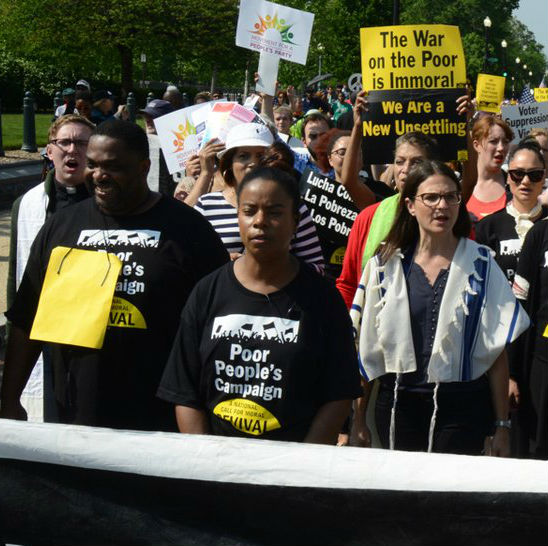Racial justice

The Problem with Korach is the Problem with “All Lives Matter”
Both of Korach’s challenges have the same structure. Korach rejects the notion that something small— either tzitzit or mezuzah—could be more important than something big. In opposing tzitzit to a blue tallit and mezuzah to a houseful of scrolls, the midrash picks up on Korach’s tactic of putting Moses and Aaron in opposition to “all of the community.” Korach invokes the whole, promoting the general over the specific, the greater over the lesser. He fails to recognize that in Torah, the detailed particulars make all the difference. In the realm of ritual as in the domain of justice, the demands of righteousness are precise.
more
Tefillat HaDerekh from Montgomery, Alabama
Written during the T’ruah delegation to the Legacy Museum and National Memorial for Peace and Justice, January 26-28, 2020 Rabbi Nina H. Mandel Bo Bo el Par’oh Come after the oppressor Join the trouble Muster your strength Gird your loins Mobilize your anger Disrupt, disrupt, disrupt Watch for bias Cry out for truth Soften...
more

How Jews Are Fighting for Racial Justice
T’ruah’s public message for Martin Luther King Day 2020: Dear Supporter, As people around the country remember Dr. Martin Luther King, Jr., we at T’ruah are honoring him by preparing for our next delegation to Montgomery, Alabama. One week from today, we will be visiting the National Memorial for Peace and Justice and the Legacy...
more

Who Feels the Pain? (Parshat VaEra)
Commentary on Parshat Vaera (Exodus 6:2 – 9:35) Who deserves human rights? Even the Torah has its blind spots. The Torah portion VaEra describes an escalating cycle. As YHWH predicts, Moses and Aaron confront Pharaoh and he refuses to free the Israelites. A plague strikes, and Pharaoh relents. The plague is removed by divine intervention,...
more

When Ignorance Brings Words that Sting: Finding Guidance in the Priestly Blessing (Parshat Naso)
Commentary on Parshat Naso (Numbers 4:21 – 7:89) Here in DC, the last couple of months have been pretty rough. In March, DC City Council member Trayon White claimed that the Rothschilds control the weather and the government, and then ducked out early from a tour of the U.S. Holocaust Memorial Museum that had been...
more

Poor People’s Campaign Resources
From May 14-June 22, 2018, the Poor People’s Campaign: A National Call for Moral Revival launched 40 days of “nonviolent moral fusion direct action,” calling on our country to change course on the deep moral crises that threaten our democracy and our survival. T’ruah supported the campaign in a variety of ways, including by publishing...
more

Every Person Counts? (Parshat Bamidbar)
Commentary on Parshat Bamidbar (Numbers 1:1-4:20) Our Torah portion opens with the taking of another census of B’nai Yisrael – the Children of Israel – this time “listed by their clans, ages 20 years and up, all those in Israel who are able to bear arms…” (Num. 1:2) This is census number three since the...
more

The Mournfulness of Her Song: Hearing the Cries of the Enslaved
On my recent visit to the National Museum of African American History and Culture in Washington, DC, I was moved to tears by one of the readings displayed in the darkened memorial room to those who were transported to America on slave ships from Africa. I learned that the chained slaves would sing songs of...
more

The House Is Still On Fire
The Torah this week introduces us to Abraham and Sarah, our soon-to-be parents of monotheism. Each year, I find the call from God familiar, yet still chilling: ‘lech l’cha,’ get up and leave your place of familiarity and comfort to journey to this new place, one that you don’t know, but which will help to...
more

Racing to Justice, by john a. powell
A group of T’ruah chaverim has been reading and discussing Racing To Justice: Transforming our Conceptions of Self and Other to Build an Inclusive Society, by john a. powell (Indiana University Press, 2003). Rabbi Bob Gluck offers this five page digest of the book, with excerpts, as a resource for chaverim looking to learn more about...
more

